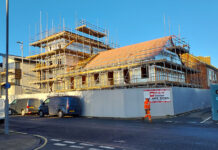
OVERALL construction activity has continued to decline in Scotland according to new research, albeit at a slower rate than seen in the first quarter of the year.
The findings are revealed in the latest Royal Institution of Chartered Surveyors (RICS) Construction Monitor.
A net balance of -9% of surveyors in Scotland said construction activity fell at all-sector level through Q2, an improvement from -20 in Q1.
Infrastructure was the only sub-sector to see a rise with a net balance of 4% of respondents reporting an increase in activity. A net balance of -5% reported a fall in private housing, -11% in private commercial, -16% in private industrials and -19% in other public works. Activity on private housing declined at the fastest rate across all UK regions with a net balance of -29% noting a fall.
A net balance of -10% of Scottish respondents anticipate profit margins will fall over the next year. Although remaining in negative territory, this is higher than the -19% seen in Q1.
Scottish surveyors also continue to report deficits in construction professionals. A net balance of 62% of respondents highlighted a shortfall in quantity surveyors, and a net balance of 49% of surveyors noted a shortage in bricklayers. The skills shortage for other construction professionals was not as severe as seen previously this year.
Iain Drummond, of Reid Associates – chartered quantity surveyors in Glasgow, said, “Scottish Government cuts to new build social housing is preventing new development opportunities. Exceedingly long planning applications periods are resulting in delays for construction phases to commence.”
Brian Minnis of North Lanarkshire Council added, “Weather issues are a significant problem, heavy and consistent rain is affecting many projects.”
Gordon Smith FRICS based in Irvine stated, “Planning procedures are adversely affecting workload, both in terms of the time and cost of pursuing planning approvals, appeals and other associated procedures such as judicial review.”
Commenting on the UK picture, RICS chief economist, Simon Rubinsohn, said, “The overall tone of the feedback received to the Q2 RICS Construction Monitor is still pretty flat, although the forward-looking indicators are a little brighter even in the area of residential development, possibly reflecting some of the ambitious talk from the new government about ‘getting Britain building’.
“However, there are some major challenges identified by respondents that need addressing to secure the more meaningful uplift in both housing and infrastructure that appears to now be the focus of policy. In particular, planning reform was very much front and centre in many of the remarks from a large number of contributors, and it will be interesting to see the impact in our figures of this weeks planning and housing announcements.
“Concerns around finance remain prevalent although there is a sense that credit conditions in the construction sector will gradually improve helped by the prospect of the Bank of England beginning to lower interest rates.”








